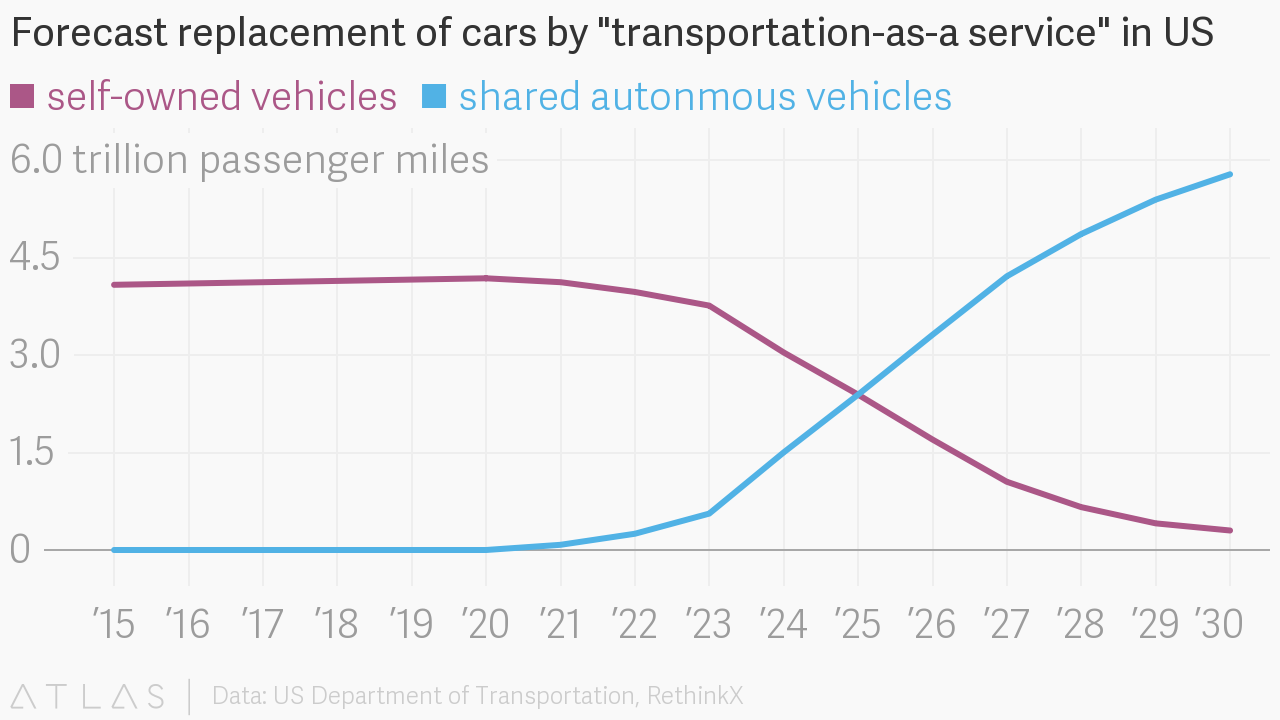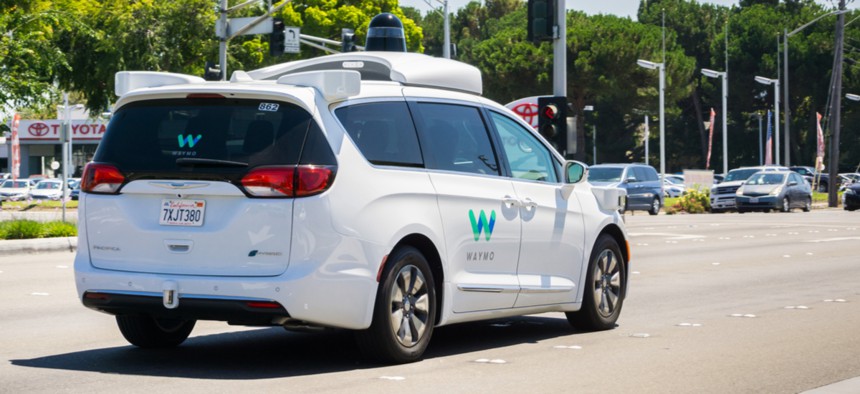Connecting state and local government leaders
We're entering a new era where transportation is an on-demand mobility service, not a product. Most owners will become real-time renters.
You’re not worrying about it yet, but tens of millions of conventional vehicles could one day be dumped in junkyards and weedy lots when self-driving, electric vehicles make them too expensive by comparison. That day is either close at hand, or a long ways off. It depends on who you ask (and whether they work in Silicon Valley or the sober consulting offices of Boston and New York).
RethinkX, a Bay Area think tank, predicts (pdf) that today’s car will become rolling typewriters far sooner than you think. By 2030, it expects shared, autonomous electric vehicles will account for 95% of all U.S. passenger miles traveled thanks to their low-maintenance and fuel costs, as well as their ability to work around the clock. Most of those miles will be logged in cities and suburbs. But gasoline cars are not going away anytime soon. They’ll likely account for 40% of all vehicles on the road by 2030, but they’ll just be used far less, and mostly in ex-urban and rural areas with less density than urban regions.
This new mobility model, known as the transportation cloud or “transporatation-as-a-service” (TaaS), will quickly take over once it comes online, says RethinkX co-founder Tony Seba. He puts the year TaaS eclipses privately owned vehicles at about 2025 (give or take). “As soon as TaaS is available,” he says, “it makes economic sense to switch.”

Not so fast, says Sam Abuelsamid of Navigant consulting who called Seba’s projections for shared autonomous vehicles “ludicrous.” Navigant’s most aggressive scenario forecasts autonomous shared transport will only represent 1% of miles traveled by 2025 in Europe and Asia, and even less in North America (although “all bets are off” if oil spikes to above $100 per barrel, or lithium battery prices plummet). “I think the RethinkX report is wildly optimistic on virtually all fronts,” he wrote by email. Analysts at Deloitte, who also believe shared autonomous transport will eventually win out, still push that point off well past mid-century (pdf). Boston-based consulting firm Bainestimates (pdf) says only 10% of new vehicles systems will be partly or fully automated by 2025.
The timing is impossible to predict precisely, but Seba insists even if TaaS arrives a bit late, a perfect storm is gathering: electrification, automation and shared transport (such as Uber and Lyft). Any of these alone would transform the transportation sector. Together, they blow up a 100-year-old business model of the global car industry and our template for getting around. In this new era, transportation is an on-demand mobility service, not a product. Most owners will become real-time renters. Fleets of self-driving vehicles plug into urban transit networks to fulfill almost everyone’s transport needs within reach of a city.
When that happens, Seba predicts the car market will enter an economic “death spiral” as operating a conventional car becomes more expensive relative to TaaS. The resale value of old cars will head toward zero as it makes more economic sense to abandon them with each passing year. Identifying this tipping point, if it even occurs, is confounded by everything from gas prices to American’s attachment to their cars, but Seba believes it will occur within a few years of TaaS offerings arriving in major cities.
If RethinkX’s assumptions are contentious, its basic math appears solid (calculations are laid out in his report). Its data is drawn from empirical research from the Department of Energy and real-world trials such as the maintenance logs and performance from Tesloop, a high-mileage Tesla shuttle service in Southern California. The real contention is less about economics, and more about regulation, psychology and the pace of technology change: Will Americans and others in the developed world give up their cars when technology makes it cheaper to do so?
Historically, Seba argues that reducing costs (or increasing benefits) by a factor of ten has always led to “disruptive” change. He points to the effect typewriters, digital cameras and the iPhone had on their respective market after offering order-of-magnitude improvements. “In the history of disruption,” says Seba, “10x marks the spot.”
But the history of innovation has something else to teach us on that front, says John Paul MacDuffie, director of a mobility innovations program at the University of Pennsylvania’s Wharton business school. Even some aspects of superior performance are not enough to guarantee mass adoption. “I don’t think you can get a ’10-times better’ story about every performance attribute” of self-driving EVs, MacDuffie said in an interview. Cost, safety, regulation, convenience, and the emotional affinity many people still have for cars are all factors. “It takes so many things to come together for a technology capability to be adopted widely,” MacDuffie says calling Seba’s projections possible but “an outlier at the high end.”
Watch cities to be the proving ground for this argument. Governments are already on board. Dubai says 25% of all its trips will be driverless by 2030, and 90% of urban transit officials believe the first urban, shared self-driving fleet will arrive no later than 2025, according to interviews with city policymakers by the Boston Consulting Group (pdf) in Amsterdam, Dubai, Düsseldorf, Gothenburg, Graz, Helsinki, Miami, Milton Keynes, New York, Pittsburgh, Singapore, and Toronto.
If you’d like to hold on to your gas guzzler, your options could dwindle. Countries such as Norway have declared their intention to ban gasoline-powered cars as early as 2025, and the UK, Germany, and others are following suit with their timelines. Automakers such as Volvo say they will only make electric or hybrid models by 2019. Tesla’s Elon Musk predicts almost all cars will be autonomous within the decade. That new world may be here quicker than you think.
Michael J. Coren writes for Quartz, where this article was originally published.

NEXT STORY: CBP tests small drones for border surveillance



